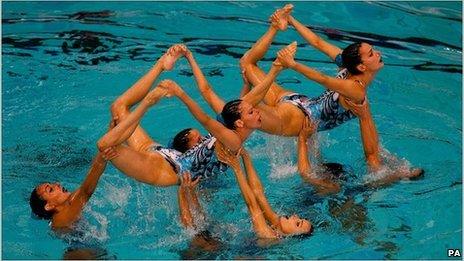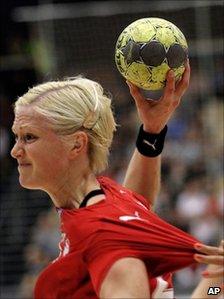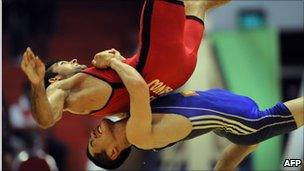Becoming a fan of lesser-watched sports
- Published
- comments

Many of those scrambling for the remaining London 2012 tickets will have very little knowledge of the sports they are going to watch. Is it necessary to become an expert or even a little less wet behind the ears?
The people who failed to get a ticket in the Olympics ticket ballot can now apply for the leftovers.
Some 2.3 million tickets are on sale and tickets are available for 310 sessions on a first-come-first-served basis. The lesser-spotted sports on offer include canoeing, fencing, wrestling and synchronised swimming.
Many Britons will be keen not to watch the Olympics from their living room when it is happening in their own backyard, and they will go for sports they know nothing about.
While some will be content with simply soaking up the patriotic atmosphere in a brand-new venue, others will want to gen up to increase their enjoyment and avoid dirty looks from the die-hard fans.
The knowledge may also come in handy when, as has happened in the past, a lesser-known sport penetrates the national psyche due to an outstanding British performance. Who had heard of the skeleton before Amy Williams won gold in the 2010 Winter Olympics?
The BBC's Ollie Williams covers sports which don't normally hit the headlines and he says there are a few, such as fencing and water polo, which are more difficult to get your head around.
But people could become instant experts on the canoe sprint, for instance, "which is the 100m only in boats".
There will be people at the events who will have "lived and breathed the sports" but the problem will be finding someone who can distil it into a simple explanation, he says.
"But all everyone really wants to know is, 'What do you have to do to win?'"
He recommends focussing on the personalities in the sport and watching them in action on the television.
"There are going to be thousands of people at some events without the faintest idea what's going on, but you can bet your bottom dollar that the organisers will try to make them as accessible as possible."
For a bit of a head start, here's a potted guide to a few of those sports which do not make the back pages.
Handball
"It's absolutely massive everywhere except the English-speaking world. It was the first sport to sell out at Athens and Beijing."
Frazer Snowdon, media officer for British Handball, says it has been an Olympic sport since the early 70s and the Europeans "go crazy for it".

Handball is, well, hands on
He says the best way to describe it is water polo but without the water.
It's a team game and there are 14 members, but only seven are allowed on the court at any one time. It is played on a 40m by 20m court, which is slightly bigger than a basketball court.
At either end, there is a goal, similar to a hockey goal, surrounded by a semi-circle. The only person allowed inside with a ball is the goalkeeper. Players have to take a running jump at the goal.
If a football is a size five, then the ball used by men is a size three, and a size two for women. They need to be able to pick it up with one hand. It is a high-scoring game, with 30 to 40 goals whatever the level.
"It's a contact sport and it can get a bit tasty," says Snowdon. "It's so fast because the ball is small and you can throw it a long distance. You will have no time to get a hotdog."
He says people with handball Olympic tickets need to pick a team at the start of the match and shout as loud as they can.
Show-off fact: A sticky resin is put on the ball and the athlete's hands, making it easier to catch but difficult to throw.
Superstars: France, Russia and the Scandinavian countries.
Greco-Roman wrestling
Its name is a bit of a give-away but Greco-Roman wrestling is very old. It was a sport in the very first Olympics.
Malcolm Morley, chairman of British Wrestling, acknowledges it is not the easiest sport to understand. It is a male, combat sport and there are seven weight categories. The wrestlers wear either red or blue.
He says the winner is the wrestler who scores the most points or pins their opponent on his back for a count of two seconds. The latter is very hard to achieve in wrestling.

A good grip is also essential in Greco-Roman wrestling
A Greco-Roman wrestler's legs are only for balance and they cannot be used to trip opponents.
"That's why Greco-Roman wrestlers have a more developed upper body because it's all about upper body strength," says Morley.
Points are earned for gaining control, executing certain throws and turning the opponent above 90 degrees.
A contender has to win two out of three rounds and each round lasts a maximum of two minutes. They start from a standing position and can win a round by scoring two three-point moves, one five-point move or by being six points ahead.
His top tip for Olympic ticket holders is sit beside someone in the know.
Show-off fact: If the round ends in zero points, then the wrestlers are punished by the "clinch". A colour is selected at random and the winning colour has the advantage. After one-and-a-half minutes of standing wrestling, the winner has 30 seconds to try and do something.
Superstars: It's an open field but Britain has only an "outside chance of a medal", says Morley.
Synchronised swimming
Jenny Gray, a world-renowned expert in synchronised swimming, says it developed from the aquatics shows in seaside towns and a British team first competed abroad in 1968.
She says the aim is to blend the technical and the artistic together. "It is definitely a sport in as much as the physical demands and skills are high."
The 14 judges are divided into two teams, one marking the technical and the other, the artistic. The marks are out of 10 and anything in the vicinity of 9.5 is near perfect.
There are duet and team competitions, and each perform a technical routine and a freestyle routine. In the technical routine, they have to do most movements or "elements" together.
The technical judges mark on the execution, synchronisation with each other and the music, and difficulty. The artistic team consider the choreography, interpretation or use of music and manner of presentation.
Gray lists what to look out for: Are the girls swimming together? Are they in time to the music? How high were the lifts?
She also says people new to the sport should watch out for a theme in the costumes and the routines. The Spanish team have a skeleton theme at the moment.
"Its like going to watch ballet or gymnastics. Even if you don't know anything about it, you can still appreciate the artistic and the technical."
Show-off fact: Only 30% of the final score is for synchronisation.
Superstars: Russia but China is an up-and-coming threat.